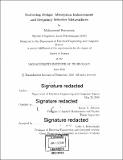Scattering design : absorption enhancement and frequency selective metasurfaces
Author(s)
Benzaouia, Mohammed
DownloadFull printable version (6.256Mb)
Alternative title
Absorption enhancement and frequency selective metasurfaces
Other Contributors
Massachusetts Institute of Technology. Department of Electrical Engineering and Computer Science.
Advisor
Steven G. Johnson.
Terms of use
Metadata
Show full item recordAbstract
In this work, we develop frameworks to study and design the scattering properties in two kinds of systems. For the first problem, we find approximate angle/ frequency-averaged limits on absorption enhancement due to multiple scattering from arrays of "metaparticles", applicable to general wave-scattering problems and motivated here by ocean-buoy energy extraction. We show that general limits, including the well known Yablonovitch result in solar cells, arise from reciprocity conditions. The use of reciprocity in the radiative transfer equation (similar to a stochastic regime neglecting coherent effects) justify the use of a diffusion model as an upper estimation for the enhancement. This allows us to write an analytical formula for the maximum angle/frequency-averaged enhancement. We use this result to propose and quantify approaches to increase performance through careful particle design and/or using external reflectors. For the second problem, we develop a design method for multi-grid frequency selective metasurfaces based on temporal coupled mode theory (CMT). In particular, we design an elliptic passband filter with a center frequency of 10 GHz, bandwidth of 10% and relatively good angle dependence.
Description
Thesis: S.M., Massachusetts Institute of Technology, Department of Electrical Engineering and Computer Science, 2018. Cataloged from PDF version of thesis. Includes bibliographical references (pages 81-86).
Date issued
2018Department
Massachusetts Institute of Technology. Department of Electrical Engineering and Computer SciencePublisher
Massachusetts Institute of Technology
Keywords
Electrical Engineering and Computer Science.